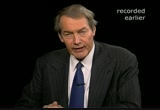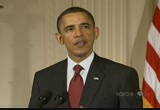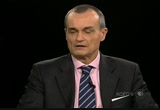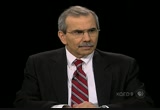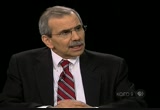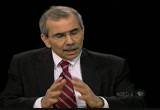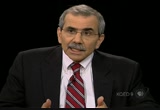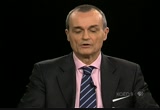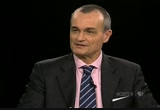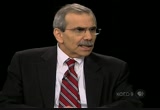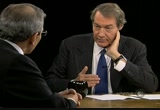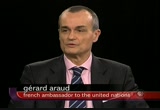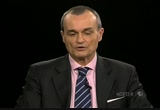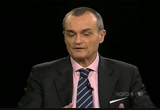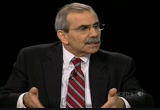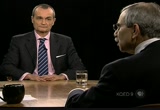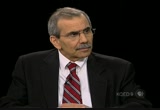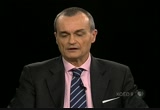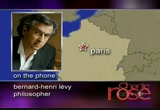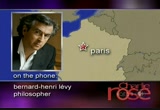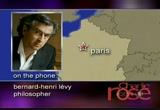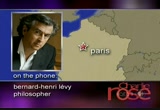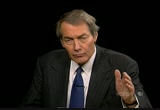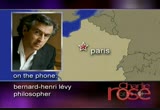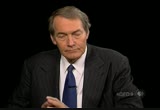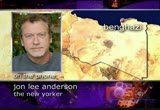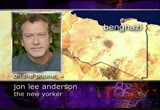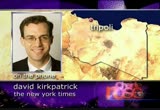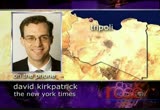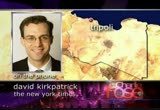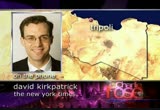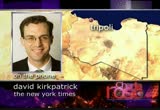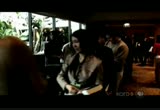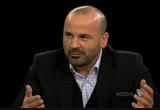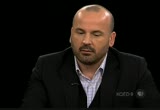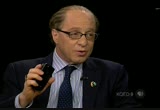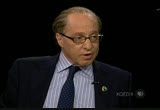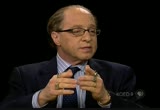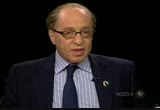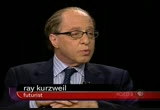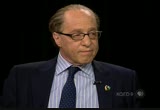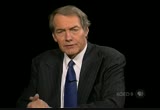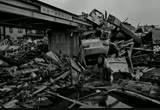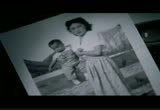tv Charlie Rose PBS March 19, 2011 12:00am-1:00am PDT
12:00 am
>> rose: welcome to our program. tonight, nawaf salam, the lebanese ambassador to the united nations, and gerard araud the french ambassador. after the french ambassador's reference to the role of, we talked to him by telephone from paris about how these events unfolded. and from libya this evening, first jon lee anderson of the "new yorker" magazine from benghazi, and then from tripoli, david kirkpatrick of the "new york times." we close this evening with kurz, the man who thinks deeply about artificial intelligence and lock jest, and the director barry ptolemy who has a new film about kurzweil called "transcendent man." the anticipation of the events in libya, the life and times of ray kurzweil, and later in the
12:01 am
program, photograph from japan. all of that next. funding for charlie rose was provided by the following: every story needs a hero we can all root for. who beats the odds and comes out on top. but this isn't just a hollywood storyline. it's happening every day, all across america. every time a storefront opens. or the midnight oil is burned. or when someone chases a dream, not just a dollar. they are small business owners. so if you wanna root for a real hero, support small business. shop small. additional funding provided by these funders:
12:02 am
captioning sponsored by rose communications from our studios in new york city, this is charlie rose. >> rose: we begin this evening with the crisis in libya. last night, the u.n. security council adopted a resolution giving broad backing to military action against all threats to civilians. the resolution also demanded a no-fly zone across the country. hours later libya's foreign minister announced an immediate cease-fire. >> i'm taking into consideration that libya is a full member of the u.n.. we accept that it's obliged to accept the u.n. security council resolution.
12:03 am
therefore, libya has decided an immediate cease-fire and the stoppage of all military oppression. >> rose: secretary of state hillary clinton said the government now needs to show it is implementing the cease-fire. >> we are going to be not responsive or impressed by words. we would have to see actions on the ground, and that is not yet at all clear. we will continue to work with our partners in the international community to press qaddafi to leave and to support legitimate aspirations of the libyan people. >> rose: there are reports today from numerous sources that the cease-fire has not taken place at this time. also later today, president obama spoke of the resolution,
12:04 am
giving qaddafi an ultimatum. >> if qaddafi does not comply with the resolution, the international community will impose consequences, and the resolution will be enforced through military action. in this effort, the united states is prepared to act as part of an international coalition. american leadership is essential but that does not mean acting alone. it means shaping the conditions for the international community to act together. >> rose: joining me now is nawaf salam, the lebanese ambassador to the united nations. also here, the french ambassador gerard araud. i am pleased to have both of them here to explain exactly what happened at the u.n., what the resolution says, and what might happen. welcome. >> thank you. >> thank you. >> rose: tell us exactly what the united nations security council is saying and what forces operating on the
12:05 am
resolution are prepared to do? >> well, first i tnk it's demanding an immediate cease-fire to qaddafi, and today president obama, president sarkozy have reinforced this demand by asking qaddafi to stop the attack against benghazi, to evacuate three main cities out in the west of the country, and to restore water to the population. he is try to playing a game, qaddafi, so we want to set conditions which are not negotiable. so, first, cease-fire. secondly, we need peace, you know, to enforce the cease-fire. so there is not only the no-fly zone because everybody is speaking about the no-fly zone zone, but there is also a paragraph 4 which is saying the international community, which means the states which volunteer have-- can take all necessary measures, which means military measures, to protect the civilian population. which means tomorrow or the day after tomorrow, it's totally
12:06 am
allowed by the security council. we are allowed to launch airstrikes against the forces. >> rose: does it specifically say, the resolution, that there will be no ground troops ask no occupation? >> yes, they're in the text, and it's really sad there will be no foreign occupation force in any part of the country in any form. >> rose: mr. ambassador, why did this take so long when everybody knew that the qaddafi forces were advancing and an opportunity when he was on-- seemed to be in retreat had passed, and the shift had begun to his favor? >> uhm, well, the security council two weeks ago issued the first resolution calling on qaddafi to put an end to any use of violence against his own people, and this was orchestrated with a number of measures, arms kbaerg-- embargo,
12:07 am
travel ban. so the security council had to upgrade the sanctions. it took long-- it took long. you have many countries involved in the security council and you are talking about measures that may include the use of force, so i mean, it's a-- it's a very high-level political decision, and it required that time. >> rose: you had extensions both in-- abstentions in terms of permanent members and others, including chine ska russia, ask you also had what zil, india, and others. >> and germany. >> rose: and germany. what was their reservation? >> okay, first of all it's important to no notethere was not one single negative vote. >> rose: and the significance of that is?
12:08 am
>> first-- the members could have blocked that resolution and they did not block it. not to the extent of voting against the resolution to a great degree an international consensus to stop the violence of the qaddafi regime, but also of the need to have upgraded the measures against the qaddafi sor he stopped. >> rose: there was some concern they didn't know what-- that this could get out of hand and become a much broader and deeper war than they imagined? >> no one can be sure of anything, but there were a number of important guidelines
12:09 am
and the resolution like the one mentioned by ambassador araud just now, that all other means, use of force, would in no way involve any occupation of any part of the libyan territory in any form. for everyone, i think that was a very important element to underline. but yet i'm sure that everyone would prefer that the message have a deterrent effect on the qaddafi regime, short of the use of force. maybe threat of the use of force would compel qaddafi to stop. >> rose: so what's the end game here? in other words, what is mission accomplished? >> i guess that's the flavor of
12:10 am
intelligent operations for every country around the table it may be a different end game. >> rose: exactly. >>. >> we do want qaddafi to leave, but right now what we want is to stop the violence. it's very clear, and especially at the moment where qaddafi was going to win because frankly his forces were moving forward very quickly towards benghazi so we want to stop him first so he doesn't take benghazi. >> rose: can you do that? >> i think we can. because today several countries have sent the notification to the secretary of the united nations that they are ready to take part in the military operations. >> rose: those countries are? >> the united states, united kingdom, france, canada, denmark is supposed to follow. we have been told also that norway, the arab united emirates
12:11 am
qatar are coming. >> rose: all have said they're prepared to send military-- >> exactly, to take part in the military operation. so that will be a large coalition. >> rose: under whose command? >> that's one of the questions that we have to solve. i think on the french side, we some reluctance to see nato there. what is very striking, i should say, is that we have acted in the security council on-- at the request of the-- the ambassador of lebanon was talk ago which is really striking. it's not iraq revisited. that's a very important element. we have been always very keen on having the arabs on board. and it president sarkozy is organizing a summit, and there will be a lot of ministers of our states to show that it's not a western intervention against an arab country. it's really all the international community, and nato is a bit seen as a western alliance.
12:12 am
>> it is our concern as well, and it was feared that qaddafi had lost his legitimacy by attacking his own people. and his son threatening his own population with-- quote, unquote-- rivers of blood. it is clear for us qaddafi is someone-- have lost their political legitimacy. but we are not here to engage in regime change. it's not-- this coalition is going to neither empower the rebels nor go enter tripoli and affect the political change. but by stopping the violence, allowing the libyans to be able to express themselves ask to choose the regime. >> rose: you're suggesting you
12:13 am
want to play a level playing field so the people who are in rebellion in the beginning will be able to take matters into their own hands and-- >> rebels or others. >> rose: or others. >> the libyan people be able without force used against them to express themselves and choose the government of their own wish and desire. >> rose: the obvious question is what if it doesn't happen with the amount of military you're prepared to use now and qaddafi is able to successfully resist, perhaps not go forward but resist, and is it going to be necessary to dial it up? is the united nations security council prepared to do that? >> this is, i think, the important element is to protect the civilian population. this is why. first a cease-fire, and talk--
12:14 am
allow measures to protect the civilian population. >> rose: it seems to me that both of you are saying qaddafi has lost his legitimacy. you want him out of the country but the only option he has is either to fight or to leave? >> yes, yes. >> we prefer him to leave. >> yes. >> we prefer him to leave, yes, exactly. >> rose: would you grant him safe passage to get out? >> i don't know, really. i should say we are in a very serious moment because we are starting-- we are going to start a military intervention, and as you know, when you start a military intervention you really don't know what is going to happen the hour after. >> rose: what are the risks that could take place here. >> my minister was the only minister coming especially to new york for voting the resolution, and he met the french press and one of the first questions was, you know, when there are airstrikes or collateral damages -- >> jon: civilians. >> and civilians are killed.
12:15 am
his answer was if we did nothing you would reproach moog for doing nothing and now you are approaching me for the risk we could have. there are risks. there is collateral damages and what happens if qaddafi doesn't move or resists. and we don't know what the libyans-- you know, maybe there will be the libyans in tripoli will try to act. so it's really-- i was working at nato at the time of the kosovo operation, and i do remember that it was impossible to foresee what was going to come. it's a question of political determination, and i do think that my president, your-- the u.s. president, your president, and the u.k. prime minister.... >> rose: what was it about president sarkozy that made him-- what was the sort of tipping point for him to say, "i'm going to recognize the rebels and we have to do something?" >> i think, of course, i'm not in the brain of my president,
12:16 am
but i think there was a french officer who went to benghazi, who the rebels and when coming back, i guess he asked the right words, convinced president sarkozy that something historical was happening. for us, libya, there is a dual feeling. we are once closeness are because they're our neighbors. it's something we feel-- it's like cuba for you, in a sense. since they are so close to our borders, it's also a sense that our security is at stake. so that's,ig, the reason why maybe france has reacted before other countries. >> rose: would this have happened without the resolution, without the arab league going forward the way it did? >> okay ti'm going to-- at the
12:17 am
same time the question of domestic affairs versus foreign intervention. >> rose: right. >> indeed -- >> what is sometimes called invasion of the sovereignty of another country. >> again, here the-- i mean, the arab league and the security council in their responses-- coming from within with libya, the libians, the libyan opposition, the rebels, the libyan opposition, the victims, the civilians are victims who first called for an intervention to protect them. the arab league endorsed that call, and the arab league, when it-- the security council was to give it an international
12:18 am
legitimacy, that any act, whether a no-fly zone or additional measures, be also carried out under the umbrella of the legitimacy. that's not foreign intervention. >> rose: was the mood at the security council that others should step forward and the united states should be a participant but not the leader of this? >> okay, i think no one wanted to see iraq revisited or not afghanistan, too. this is why it was very important in the resolution to make it clear that no one is talking or would like to see any form of occupation in any part of iraq. and this was not for intervention. it was for something coming as a-- at the request of the arab league and of the libians themselves. and i think these are very
12:19 am
important elements-- >> the arab league was-- i think without it we wouldn't get the resolution. >> let me add something if i may. the libians, the arab league called for it. the other game changes they are going to have a significant arab participation in carrying out this resolution, which would enhance its legitimacy. >> rose: what about this scenario, having this resolution in place, saudi troops, troops from the emirates attack people in the streets, will the united nations come to their defense? >> we are talking libya? >> rose: no, we're now talking about bahrain. i mean, i'm serious, though, that is the dilemma, is it not? >> of course. un, a lot of people are saying,
12:20 am
what are you doing to hibia, why don't do you it in other places in the world and not only bahrain. my answer is when you have-- you have 10 problems it's not because you have 10 problems and try to solve one problem. by doing it we are not hypocrites but simply because we have this problem. there are other problems. bahrain is another problem, and the secretary-general of the u.n. has expressed his concern, saying the violence against the civilians could really constitute crimes. >> rose: thank you. i know i promised you would be out of here because of other commitments and i thank you for coming. >> thank you. >> rose: thank you very much as well. we'll be right back, stay with us. after the french ambassador's remarks, we called him in paris
12:21 am
to get his impressions of libya and what he saw. he's a friend of this program and we're pleased to have him on the program tonight from paris. welcome. >> thank you, pleased to be there, too. >> rose: tell me what happened. you went to benghazi and other places. what did you see? what whatdid you decide you needed to say to the french president? >> first of all, i saw the prime minister at the beginning of the the beginning of a bloodbath, i saw young people badly armed in front of the very strong and very savage mercenaries army. this is the first point, an army of mercenaries waging a war against the civilians of libya. some planes bombing civilians, i
12:22 am
saw the beginning of mass legislature. number two, i met the free libyans. they are not angels but they are good guys, honest-- i had great and long talks with them. i perceived, i understood that they are today real possible alternative, that they are not involved in-- and we should support them. i called my president, president sarkozy, and i told him i met some guys who are the equivalent in libya of what general de
12:23 am
gaulle was for france 60 years ago-- free libyans. would you, president of france, accept to receive them, to host them for a few hours? president sarkozy replied, "yes, of course." so a few days ago i went back to paris with these three guys, including the chief of the delegation, the former min stefr justice who is now in charge of foreign affairs in this transition government of free libyans. i brought them to the white house in paris, in a sense, and sarkozy told the delegation the following-- number one, i consider you a legitimate representative of libya today.
12:24 am
qaddafi is no longer the legitimate representative of libya. are you. the french ambassador to libya will be from today, from this moment, settled in benghazi. you people of benghazi will send-- who will be ambassador of libya. then sarkozy said if we have the agreement of the security council of the united nations, if you national council of free libya ask us directly, and if we have the agreement of the arab league, we will come and-- the places from where qaddafi orngzs these acts of aggravation. we, france, with england, with
12:25 am
all our allies, with america, of course, and where w arab countries, we will bomb the airstrips, the columns of these bloody... who is muammar qaddafi. >> rose: i assume that you have-- this conversation and this meeting took place what, a week ago or 10 days ago? >> it took place eight days ago, exactly. >> rose: eight days ago. so we then last night had the u.n. resolution here. have you talked to these leaders by telephone or any other means so that they gave you a sense of how they see what the impact of the military actions against qaddafi will take place and what impact they might have? >> i spent all last night on the phone trying to get through and
12:26 am
getting through to them. i spent the whole night speaking with these men and women, by the way, in benghazi and in tabruk. they were so excited, so thrilled, so happy of what happened, of this u.n. resolution, of this unprecedented acts of attack, moral condemnation, so quick. remember, in bosnia and sarajevo it took four years, four years. in afghanistan, it took years, also, to condemn clearly the taliban, and to endorse and support the inheritors of commander massoud. here in libya, it took three weeks. so they were thrilled. they were happy.
12:27 am
they said, "thank you, france. thank you, europe. thank you, great america. thank you, obama. thank you, clinton. thank you sarkozy." >> rose: i thank you for joining us this evening. i know it's very, very late in paris. >> thank you, charlie. >> rose: joining me on the telephone from benghazi is jon lee anderson. he has been sending dispatches from the front to "new yorker" magazine. i am pleased to have him here this inning. >> charlie, thank you. it's good to be here. >> rose: what are the expectations over the next 24 hours? >> the day started with quite a bit of elation after last night's approval of the no-fly resolution at the u.n. security council. it was extremely tense yesterday with the first bombing raids over-- probes, i should say-- but with some bombing over benghazi by qaddafi's forces. the war definitely felt like it
12:28 am
was going to finally come to the city which has been the crucible of the revolution in the past month, and since is t began a month ago. and then it was very tense, as i said yesterday. this morning people were very elated, very euphoric. there was a kind of expectation all day. there are car thorns behind me because now that euphoria has turned to alarm, which i'll explain. there was an expectation all day that the french or the british-- nobody knew exactly who-- would begin airstrikes to stop qaddafi's forces in their seemingly inecorable advance around the city. and instead, as the afternoon drew to a close, we were hearing that the western city of mass ratta, another rebel stronghold, was being pounded by his forces, and that there was actually fighting in and around the neighboring city about 80 miles southwest of here. >> rose: as far as you know, do the leaders of the rebels, the--
12:29 am
have go kb idea why airstrikes against qaddafi's forces haven't start because at the time of the nurchld resolution, there was talk in new york that it might begin to happen within hours. >> exactly. yes, i know. and that's what was t expectation here. and at various points today, in fact, you know, rurps have spread that, you know, someone has said to someone else that it's imminent. and meanwhile there seem to be armed exchanges and seemingly under the cover of night his troops are advancing. the feeling here is the west has been caught unprepared, it's been outfoxed by qaddafi, that he's not good to his word, and people here were, you know,-- are very frightened that his forces will in fact reach the city, penetrate it, and do harm
12:30 am
before they can be stopped. >> rose: how do people on the ground who are part of the leadership and those who are followers but in the fight, feel about the aid coming from the united nations, and do they ask why didn't it come earlier, and & what do they say to the fact that they find themselves here in benghazi their backs to the wall and it may be too late? >>, you know,, there's a mixed bag of emotions in the last fewer days. i mean, i had some mild altercations with people who began to, as-- as qaddafi's forces drew nearer over the last few days, you know, turned on me as a westerner to ask me why, exactly what you have asked me, why hasn't the u.s. come to our help? where is obama? what will it take for the outside world to come and save us? and a lot of cynical ideas about why the west-- why the outside
12:31 am
world hasn't. the presumption that there are oil deals involved. and of course in the case of states that abstained today, they've been talking about the amounts of money that those various states have invested in libya. but also, you know, you go around town here in the last few weeks and people would say very bravely, you know, that we don't need outside help. we want to do it on our own. so there's this mixed bag of emotions here among the people. i mean, bottom line, my sense is that this is a people who feel quite humiliated by their circumstance. they're a proud people. they didn't want to have to be helped. they didn't particularly want the u.s. to come as the sheriff, to save them. they wanted to do it on their open and they they thought they might be able to with a little bit of help, possibly a no-fly zone. but in the last few days, it's
12:32 am
become clear without some sort of military strikes that they really are doomed and, of course that euphoria, that bravery, that bravado has turned to real alarm and fear, naturally. so there's a real mixed bag. but privately, for some time now even the leaders of this resolution have said they need real help but it's difficult for them to say so publicly. they've been humiliated by qaddafi for a long time, and they don't want-- they're a proud people and don't want to appear to be a basket case of the international community. that's my sense. >> rose: who are they? >> you know, it's civic society. it's the residents of a once-proud mediterranean city way long, long, long history. i mean, there are petroleum engineers who went to school in oregon and ohio and england in the 70s.
12:33 am
un, who have children now in their 20s who have not had the benefits they had of education, that grew up under sanctions and-- but nonetheless, have had in the last 10 years, a sort of opening sponsored by qaddafi's son sai"f," an apparent heir. and relative freemz, but nonetheless, living up in a kind of isolated land. sustained by oil money. but it's being done in a very slipshod way. you have these 20-something udents that are quite brave and idealistic. they've had access to the internet and all those ideas that have flowed through that device, you know, around the world. and then their parents who, you know, were terrified into silence in the 70s and 80s by seeing fellow students hung in public by qaddafi here and in other places for daring to speak
12:34 am
their minds. and finally they are now coming to the streets and trying to help interest these kids who have corrected this formless, euphoric revolution, which has now been boxed in by qaddafi's relentless it, you know, military drive against them. so that, in a nutshell, and with all of the vagaries of what i just described, that's it. it's a mixed bag of a society that's much like any other society-- a bit of everyone is involved here. >> rose: jon lee thank you so much. i know it's difficult to find a place and a phone to communicate and we are deeply appreciative of you doing it this evening with us. it. >> rose: joining me now on the telephone from tripoli is david kirkpatrick. he's a correspondent with the
12:35 am
sdmimz has been covering the uprisings in the region. i'm pleased to have him back on this program, welcome. >> it's good to be with you, although it's getting a little bit-- little bit long here in tripoli. >> rose: yes, i can imagine. tell me what they are saying in tripoli, the government, about the cease-fire, the u.n. resolution, where they are militarily. >> well, there's been a bit of an about-face today. in the previous days we'd seen a kind of ramping up of the already pretty heated rhetoric from colonel qaddafi and his son sai"f," about coming after the rebels, house by house, a river of blood, quite vigorous rhetoric. today they said they were going to comply with the u.n. resolution and implement a cease-fire. r they said that mid-day tripoli time. and it took us a little while to be sure but now it's pretty clear that that was mostly rhetoric, that the cease-fire
12:36 am
did not take place for sure on the eastern front where people are still continuing to flee the town of ajdabiya. witnesses in maz ratta,-- there are no journalists there because the city has been completely cut off-- say that city in the west continues to be shelled. and in-- in tripoli, a neighborhood which has been a hotbed of opposition to qaddafi, tried to hold a peaceful protest today. when they left their mosque after midday prayers, they were met by an overwhelming contingent of police who immediately fired their guns into the air and the crowd scattered and they were blocked from returning to their mosque for evening prayers. so there doesn't seem to be much of a meaningful cease-fire yet
12:37 am
the deputy foreign minister said at a press conference that the cease-fire was in effect and he asked the international journalists to confirm that and draw some lines so they could respect some borders. >> rose: did they suggest what might happen if there is a very strong military reaction from the u.n. forces? >> you know, yesterday, the talk was of a kind of wild, crazy, even, was the word that colonel qaddafi used, retaliation. he said if the world goes crazy, we'll go crazy. and they were talking about attacking commercial and civilian vessels and aircraft over the mediterranean. no one will be safe. last night, that was withdrawn, that threat was no longer operative. today there's been no talk of retaliation ask all they've said is, you know, we would like observers to come. we're enforcing the cease-fire. and trying to comply with this
12:38 am
resolution. obviously, it's a tricky situation for all concerned because i think the qaddafi government is right when they say that the rebels are likely to try to capitalize on the cease-fire to provoke some sort of a flash, especially on the eastern front. the city of mass ratta is basically surrounded and under siege. i don't think they're going to provoke anything. they're just going to hunker down. >> rose: what do the qaddafi people think they can do if, in fact, there is a military attack from the nato countries or the u.n. forces? >> there seems to be quite a bit of fear around the qaddafi government of the possibility of airstrikes. some of that might be because the rhetoric from the qaddafi government has been that the west is just-- has just been waiting for any excuse to strike that the west wants the oil, the west is collaborating with the rebels and behind all this is a desire to bomb tripoli.
12:39 am
and believe it or not, although that's certain not what you hear from any of the western capitals it's possible some of the people in the qaddafi government believe their own propaganda. i think some of them are afraid bombs will start falling quite shortly in their own neighborhood. >> rose: so what are we waiting for next? >> well, the big question-- the two questions are how far will the west go? you know, what do they mean when they say, no-fly zone? is it a no-drive zone? what will they do soo how much will they do to try to constrain the superior military power of qaddafies forces. and a related question is what do the rebels do in that situation? is it the idea of the west that basically they are going to pin down qaddafi so the rebels can have their way with him, or are they going to do something less than that, that still allows qaddafi to clobber the rebels.
12:40 am
or if qaddafi is visibly constrained, will there be an uprising across the country? as i mentioned earlier, in nabzs like tagura, for sure, there are people who would like to take to the streets once again. they would probably also like to burn down more police stations and stage a massive uprising. it could be by shackling qaddafi even a little bit, the woft will unclear popular uprisings around the country which would then involve the rebels. so there's a lot to watch here. >> rose: thank you, david. it's a pleasure. >> alwaysed any to talk to you. >> rose: "transcendent man" is the new film from director barry ptolemy, who chronicles the life and ideas of ray kurzweil, the famous author, adventureure and
12:41 am
futurist. here a look at the film. >> the reason i'm calling today is to express my disappointment that you have invited this highly sophisticated crackpot and given him a national forum to express his pseudoreligious predictions that have no basis in objective reality. >> if you go back 500 years, not much happens in a century. now a lot happens in six months. technology itself gets faster and faster. it will continue, and in about 40 years it will be moving so fast, the pace of change will be so astonishingly quick you won't be able to follow it unless you enhance your own intelligence by merging with the intelligent technology we created. >> this guy is freaking. he says computers will have consciousness in just 25 years. >> to get to-- you're not going to be able to tell the
12:42 am
difference between the machine and human intelligence. >> he has one of the best track records in history. >> he is an award-winning scientist and engineer, a millionaire several times over because of his inventions. >> these inventions may end up causing the worst war that humanity has ever had. >> corporations and governments and society will be created and destroyed on the back of the technology it described. >> enventor ray kurzweil thinks one day humans may be able to live forever. >> i want to live as long as i can. i don't want to die. if following ray's regimen would put that day off, i am very willing to do that. >> i knew there was a reason i was keeping all this stuff, and he kept all this stuff. >> i do plan to bring back my father, our challenge should be
12:43 am
to know him north try to create him. >> i'm afraid of you. >> i do scare a lot of people >> world is changing far too fast. nothing like this has ever happened to homosapiens before. >> these ideas are going to ultimately change the world. >> we didn't stay on the ground, we didn't stay on the planet, we didn't stay within the limitation of our biology. >> he has used the gift that he was given for the betterment of humankind. >> it will be the universe waking up. >> rose: joining me now ray kurzweil and barry ptolemy. i am pleased to have both of them here. welcome. >> it's great to be here, charlie. >> rose: congratulations on the
12:44 am
film. >> thank you. >> rose: so how did you meet him and why did you decide that you wanted to make a film? >> well, i read his book in 2006 and i hadn't made it to chapter 2 and i knew that-- the ideas were striking me and i knew i wanted to turn it into a film immediately suspect ppa so we got together, the financing, and after several months, we contacted ray and he was good enough to allow us to-- to cooperate and allow us to follow him around the world and for over two years we followed him around to over 3063 cities in five countries. >> rose: what intrigued you most about what he says? >> i think the concept of the singularity overall. the concept that we are-- we happen to live at the precise moment when the strides in technology are becoming so great that they're going to affect you and i. that's a profound idea. >> rose: lots of people are thinking about this.
12:45 am
this is the cover of "time" magazine february 21. 2045, the year man becomes immortal. it says, "if you believe humans and machines will become one, if you believe humans and machines will become one, welcome to the singularity movement." >> by the way, we're already merging with our machines. as ray says, we already are the human machine civilization. there's nowhere you can go on this plan ask be separate from our technology. the problem is people think of technology as being iphone and facebook and they don't see it as being this table or coffee squp or a poem by shakespeare. but when you see technology like that, you understand it's always been a part of who we are and it's always made us more human. >> i mean, we're the only species that does that, extend our reach with our tools. there are already people putting computers in their bodies and brains, parkinson's patients, deaf people with cochlear implants.
12:46 am
ultimately, weelz do it noninvasively. they're getting smaller and smaller. this was the size of a building when i was a student. >> rose: the power of that. >> this will be in the size of a blood cell and much more powerful. this is also a billion times more powerful per dollar than when i was a student. that trend will continue. we'll be able to send very powerful devices the size of blood cells into our bodes and brains, keep us healthy, extend our thinking. this might as well be in my body and brain because it is part of who i am-- and by the way, half the farmers in china carry devices like this. >> a kid in africa with a smart phone has access to more information than our u.s. president did just 15 years ago. that should be a very powerful statistic for people to listen to. >> rose: it's a powerful idea, it really is. let's talk about singularity in 2045, the year man becomes immortal. >> a big idea is artificial intelligence, which is progressing also exponentially.
12:47 am
>> rose: what do we mean by "artificial intelligence?" >> it means machines performing functions that used to require human intelligence, and the list of those tasks is getting broader and broader. i wrote actually-- another prediction i made in the early 80s, is a computer would take the world chess championship and when that happens we will immediately dismiss chess and say it wasn't so important after all. we said chess is not really a creative game. there is something to do that. chess is the kind of game you would expect a logical machine to be able to perform. what people said at that time is computers would never really master the subtleties of human language-- metaphors, ironies, puns, similes. so i mean are the recent watson
12:48 am
demonstration is a pretty powerful demonstration that computers are handling pretty subtle forms of language. because watson not only had to understand the little query. it had to understand the hundreds of thousands of pages of natural language documents dumped into it. >> rose: were you surprised by what happened with watson? >> no. i wrote article articles beforehand that watson would win. once a computer can do something like that, it can then apply that ability to millions of pages of knowledge. we were hard pressed to remember sometimes, a handful of phone numbers. so it can master a vast amount of knowledge. it actually was operating slightly below human levels but it can then read everything and have a far more knowledge than we can handle. >> rose: let me show a couple of clips of film. >> the reason that information
12:49 am
technology grows exponentially is we use the latest technology to create the next. each generation of technology grows exponentially in capability, as the speed of that process accelerates over time. this is true in general of an evolutionary process. in fact, even biological evolution, long before even humans evolved, shows the same phenomena. the very first paradigm of biological revolution was the evolution of d.n.a. the next stage, it the explosion when all the animals evolved, only took a few years. evolution shifted from biological evolution to technological evolution. it took tens of thousands of years to evolve stone tools,
12:50 am
fire, the wheel. and then we use the latest technology to create the next technology so the whole pace of technology has accelerated. major paradigm shifts like search engines evolved in five or six years. we get to the point of astonishingly quick change is because it's going to go into very fast gear over the next several decades. >> rose: what is the driving idea that kpits you the most? >> i think it's the unification of all these different fields being powered by information technology. we see its impact on politics just in the past few weeks. social networks have start tleed revolutioning just in the last few weeks. it human communications is politically very powerful. health and medicine was not an information technology.
12:51 am
it now is. and there are lots of tools now growing exponentially in power. that's a tremendously powerful idea. and artificial intelligence is going to permeate our world. it already is. our civilization would grind to a halt if all the a.i.s today stopped tomorrow. it's narrow a.i., but it's graduately getting broader. when you look at watson you get a feel of how sophisticate it is becoming but i see it as an amplifier of who we are. i have a team of people who can do in three months what used to require several people years. it i used to spend a week in the library to do what i can now do in minutes. >> he nailed it on the head, technology amplifies who we are. i think the question we should ask is who are we?
12:52 am
who do we want to become? >> rose: take singularity, you're not, as some worry about, the subjugation of the human race? >> there are risks of conflict and oppression. you can imagine the technology used to enforce a totalitarian state with spies everywhere. the technologies are democratizing. that's what i wrote in 1980 in my first book. >> rose: things like nanotechnology is democratizing. >> communication technologies certainly are. the growing ubiquitous of everybody being in touch with everybody else it makes it impossible to control information. >> it harnesses another that you felt yours, which is the wisdom of crowd and we try to tap into wizz dops of crowd and it's going to be hard for us to make decisions for large quadrants of
12:53 am
population. >> you see both. you see lynch mob mentality on the web and wisdom of crowd on the web. >> rose: this is the time cover story," it's a lot about ray. the film, "transcendent man," the director barry ptolemy. i thank both of them for coming. we will keep watching. thank you. >> thank youings. >> thank you, charlie. >> rose: thank you. one week ago today a devastating 9.0 earthquake and resulting tsunami set off a nuclear emergency in japan. the world has watched with grief and horror as the country struggles to recover from the disaster and defuse the nuclear crisis. estimates of the death toll from the quake range from six,900 to 10,000 so far and has left about five help,000 people homeless. japanese prime minister naoto kan said the situation
12:54 am
there is very grave but they will rebuild japan from skach. "time" magazine photographer james notchway arrived in japan within 48 hours of the quake. he has said the scale of the disaster there is beyond belief. the ocean just destroyed, obliterate aid huge coastal area of japan. we close tonight's program with a look at some of these images which appear in "time" magazine.
97 Views
IN COLLECTIONS
KQED (PBS) Television Archive
Television Archive  Television Archive News Search Service
Television Archive News Search Service  The Chin Grimes TV News Archive
The Chin Grimes TV News Archive 
Uploaded by TV Archive on

 Live Music Archive
Live Music Archive Librivox Free Audio
Librivox Free Audio Metropolitan Museum
Metropolitan Museum Cleveland Museum of Art
Cleveland Museum of Art Internet Arcade
Internet Arcade Console Living Room
Console Living Room Books to Borrow
Books to Borrow Open Library
Open Library TV News
TV News Understanding 9/11
Understanding 9/11

